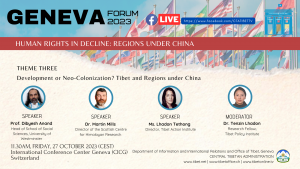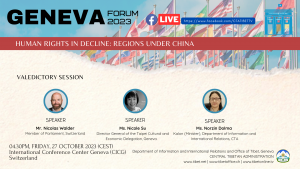Chinese President Xi Jinping’s rule has been characterized by the acceleration of artificial intelligence (AI), repression of civil-society and ideological control. His tenure in China has seen a combination of communication crackdown, ramped-up propaganda and rapid expansion of surveillance with the introduction of continuous efforts to bring new laws and changes in the Cyber Administration of China (CAC). Through the country’s internet regulator, CAC, China has strictly extended its iron grip and tightened control over the flow of information. Beijing spends billions of dollars annually on an “antidemocratic toolkit” of nongovernmental organizations, media outlets, diplomats, advisors, hackers, and bribes all designed to prop up autocrats and sow discord in democracies.
Inside Tibet, over the last decade, surveillance technologies referred to as the “nets in the sky and traps on the ground” have further suppressed the fundamental freedoms of expression, movement and assembly. New and highly advanced technologies have given unrestricted and illicit power to the state security apparatus to intensify and escalate mass surveillance. Checkpoints with smart surveillance and facial recognition are present in cities and at crossings between neighboring districts and provinces. Tibetans inside their homes are tracked through their phones and once they step outside surveillance and facial recognition technologies follow them wherever they go. This is the reality of today’s Tibet under the People’s Republic of China (PRC). The full extent and scale of China’s oppressive surveillance system in Tibet — which could very well be more draconian than what has been documented so far — is yet to be ascertained due to the lack of access to Tibet. Surveillance in Tibet is widely characterized as “Orwellian.” In addition to the traditional security surveillance measures in place including military, police, and neighborhood spies, modern surveillance technologies have been specifically developed and tested in Tibet.
The extensive security measures currently being practiced against Uyghur people were previously practiced and perfected in Tibet by Chen Quanguo, who earlier was the Party Secretary of the so-called Tibet Autonomous Region (TAR). Following his highly repressive policies in “TAR”, Chen was appointed as the Party Secretary in the so-called Xinjiang Uyghur Autonomous Region and continues to be the chief architect of the massive surveillance and mass detention system in East Turkestan. China’s intensive use of high-tech surveillance, including AI and transnational repression, has further stifled the voices of the Tibetan people, leading to self-censorship. Under Xi’s authoritarian rule, through the manipulation of a series of new laws, Beijing continues to subdue freedom of expression and infringe directly upon individuals’ privacy and daily lives.
China’s repressive state control apparatus and violations of human rights are conducted through its surveillance networks such as the Great Firewall, surveillance grids, and new technologies for social control, which is aided by AI, biometric and other data collection to not only monitor but also to shape the minds and behaviors of its citizens. These are threats to fundamental rights of peoples oppressed by the PRC.
China’s long arm across borders to silence critics and dissents, among their diaspora and exile communities beside the virtual world has increased sharply in its aggressiveness and prevalence. Transnational repression is carried out in the forms of threats and family intimidation, abductions, illegal deportations and assassinations orchestrated by the PRC. Moreover, China’s transnational repression is a growing threat and concern for many governments and people in the free world as people are targeted anywhere in the world.
According to Freedom House’s research, the Chinese Communist Party (CCP) conducts the “world’s most sophisticated, comprehensive, and far-reaching campaign of transnational repression”. Therefore, it is unsurprising that the Chinese government uses transnational repression more than any other country in the world. The CCP targets both individuals and groups abroad, including pro-democracy activists, human rights defenders, Tibetans, Uyghurs, Mongolians, Hong Kongers, Falun Gong practitioners, journalists and others who criticize the Chinese communist regime.
The global reach of China’s repressive efforts in international and intergovernmental bodies is evident and grabbing much attention for all the wrong reasons, especially the sinicization of the United Nations. How a country that is guilty of committing most egregious human rights violations including genocide and invasion can be on the UN Security Council as a permanent member, and be reelected on the UN Human Rights Council with a mandate to “promote and protect human rights around the world” merits another discussion in itself. But the degree of China’s active and aggressive expansion of its interference at the UN and persistent attempts to redefine human rights by promoting PRC’s language of “human rights with Chinese characteristics” and having like-minded, authoritarian countries to praise China is unsettling.
Generating concerns in the international community, some of the democratic countries have condemned China’s extraterritorial repression, including the United States which has introduced a bill called “Transnational Repression Policy Act” to curtail and counter transnational repression seeking to stifle and assault dissents living in the United States. This US bill seeks to establish US policy to hold accountable foreign governments and individuals perpetrating transnational repression when they stalk, intimidate, or assault people within the US and US citizens in foreign countries. More host countries adopting similar policies on China’s transnational repression that would prioritize and ensure the protection and safety of its citizens and residents would act as a deterrent and make those foreign agents, government officials, etc. accountable for the violations of international human rights and the laws of the host countries. The height and scale of China’s cross-border repression is extremely concerning, supplemented by the sophisticated surveillance tactics opted by the authoritarian government, including the establishment of over a hundred covert overseas Chinese police stations in more than 50 countries. If left unchecked and unresisted, the extent of the CCP’s transnational repression could penetrate beyond exile communities, and into foreign parliaments and governments, and for that very reason, host countries are now contemplating to recognize China as an official threat to the safety and interests of their country.
***


